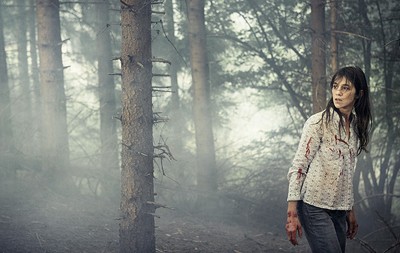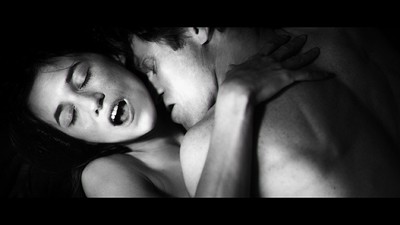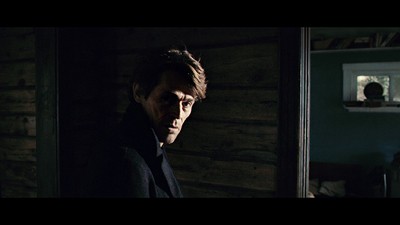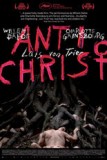| Reviews & Columns |
|
Reviews DVD TV on DVD Blu-ray 4K UHD International DVDs In Theaters Reviews by Studio Video Games Features Collector Series DVDs Easter Egg Database Interviews DVD Talk Radio Feature Articles Columns Anime Talk DVD Savant Horror DVDs The M.O.D. Squad Art House HD Talk Silent DVD
|
DVD Talk Forum |
|
|
| Resources |
|
DVD Price Search Customer Service #'s RCE Info Links |
|
Columns
|
|
|
Antichrist

Lars von Trier, how do you do this to me? And why? I can't think of a single filmmaker whose films I admire this much but that I have to gear myself up to watch. Knowing what a difficult, provocative director you can be, and advance word that your new movie Antichrist was extremely harsh, I prepared myself as best I could. It wasn't enough.
Francois Truffaut had a theory that a viewer was not properly prepared to critique a film until he or she has seen in three or four times. I would agree with that in the case of Antichrist. There is a lot to sort through here. Unfortunately, I'd be lucky to sit through the movie a second time without closing my eyes at crucial moments, much less give it a third or fourth viewing. This is a movie that is profoundly unsettling by design. It is erotically charged, graphically violent, visually creepy, and disturbing in its philosophy. I can't say I loved it, I am too nauseous, but I am astonished by it. It's incredible work from von Trier, who is easily one of the most challenging filmmakers working today. He is perhaps best known for Breaking the Waves, Dancer in the Dark, Dogville--all films that feature a female protagonist that must in some way contend with madness, be it personal or societal. Antichrist boldly continues this tradition.
The story is simple enough to set up: a married couple, known only as "He" and "She" and played with unflinching resolve by Willem Dafoe and Charlotte Gainsbourg, lose their son when he falls out the window while they are having sex. The woman is overcome by grief, and when all her doctor does is try to medicate her pain away, the husband takes over her treatment. He is a therapist by profession, and he believes human emotion, no matter how tragic, must be explored. Realizing that the symbol of his wife's greatest anxiety is the forest cabin where she spent her last summer with their son, he takes her up there to make her face her fears head-on. The cabin is in a part of the woods referred to as Eden. Obviously, paradise this is not.
Almost immediately upon arriving in Eden, the man starts seeing the woman's madness manifest, though he's not aware that's what he is witnessing. Nature itself is reacting to her, and he is witness to sights both grotesque and ominous, some of it perfectly natural, some of it more mystically symbolic. Alone in their cabin, they ride the stages of her mourning together--she can turn cruel or horny or depressed in a heartbeat, and the film is split into three states: grief, pain, and despair--until the weirdness becomes too overwhelming and the full insanity is unleashed.

Antichrist is sure to stir up debate. The film opens with an explicit sex scene, one of many, and its climax is full of upsetting images of very real violence, including genital mutilation. Lars von Trier understands the power of both things, and Antichrist requires a balance between them. Were he to shy away from either, the impact would be lessened. The violence is sexual, the sex is violent, the physical punishment is an exertion of control on an out-of-control world. I can't even imagine what the actors must have subjected themselves to in order to give von Trier what he wanted. Both Defoe and Gainsbourg are remarkably real and frighteningly honest on screen. If they were any less, this movie would not be so excruciating. Cinematographer Anthony Dod Mantle, who is a regular von Trier collaborator and who put the gloss on the dross that was Slumdog Millionaire, captures an environment that is quite beautiful, even when it is sickening. Images of death and decay are just as lush and colorful as the life that thrives all around. Profound nightmares are enacted with a dreamy sort of peace. In this, I see parallels with the on-Earth scenes in Andrei Tarkovsky's Solaris. von Trier dedicates Antichrist to his former mentor, and from that venerated filmmaker, the Danish director has learned to demand patience both of himself and his audience.
The extremes of Antichrist are purposeful, this is not just shock for shock's sake. Lars von Trier is definitely saying something with this movie, though I am not sure everyone will agree on what that is. The writer/director has been charged with misogyny before, and Antichrist has him in hot water again, even winning a special anti-prize at Cannes. I've always found his portrayals of women to be sympathetic and, in their way, empowering. Dogville, for instance, ends with Nicole Kidman's character punishing those who had wronged her. Though many may argue that von Trier's ruthless portrayal of all those misdeeds is suggestive of diseased motives on his part, it's not a label I'm willing to hang on him. Nor am I willing to do be so quick to judge here. I think Willem Dafoe's reaction to his wife's revelations are key in interpreting the piece overall. She is a woman who has studied the history of violence against her gender, and her belief that maybe this is deserved, that there is something uncontrollable about women that must be contained, is not just a symbol of the madness she suffers, but a product of that abuse. Like a self-punishing version of Stockholm Syndrome that casts history as the captor.
More than the Tarkovsky influence, I actually see Ingmar Bergman's fingerprints all over Antichrist. You wouldn't have to work too hard to con me into thinking this was one of his unproduced scripts. Like von Trier, Bergman always wrestled with spirituality. In their films, mankind wants there to be something greater but fears that there is nothing to be had. Nature serves as a stand-in for God, a force that operates without our input or understanding. The division between our social constructs and our base nature is tragically thin, and efforts to contain either will be fruitless. Willem Dafoe's character is the one who sees all of the supernatural visions in Eden, yet he makes no effort to engage with or understand them. His mantra for his wife is that she should not attempt to explain the irrational, just let it happen. In this way, he may be more ill than her, possessed of a kind of cultural disorder that keeps him outside of the deeper experience and in turn pushes her further into the insanity. He is outside of nature, she is within it, even subject to it. When the woman's prophecies about the "Three Beggars" come true, manifesting as a deer, a fox, and a crow, he can only say they don't exist. This only leaves us to ponder what we have seen, as well. He embodies a white knight syndrome that says a woman's problems are fixable, and his drive to compartmentalize her anguish turns her into a male nightmare, the crazed female who will do everything to prevent you from leaving her.

Does this make the woman more knowable, even if her behavior is harder to understand, just because she is more open to feel and to expressing those feelings? Antichrist is ambiguous to be sure, and von Trier isn't above punching a few volatile buttons. That title alone is meant to provoke and will likely be central to any arguments that the movie is misogynist. (Though, as Roger Ebert reminds us, the literal translation of the original term is "opposed to Christ," and so a being devoid of goodness rather than a theological opposite; religion doesn't even really come up in the context of the movie.) The final image of the movie doesn't help either. It's one of the things that haunts me the most about the film, even more than the brutality. How you interpret that scene, whether you see what arrives as coming to positively reclaim their own or to destroy what has created them all, is going to be crucial to how you ultimately feel about Antichrist. Regardless, it is not a film you will soon forget.
I recommend Antichrist highly, but I do recommend it with caution. The squeamish will not fare well watching it, and it may be a strange movie to screen with a member of the opposite sex, particularly one you care about. (If someone takes you to this on a first date, don't agree to a second.) It's a film I liked, and one I'll like talking and reading about, but not one I particularly liked watching.
Jamie S. Rich is a novelist and comic book writer. He is best known for his collaborations with Joelle Jones, including the hardboiled crime comic book You Have Killed Me, the challenging romance 12 Reasons Why I Love Her, and the 2007 prose novel Have You Seen the Horizon Lately?, for which Jones did the cover. All three were published by Oni Press. His most recent projects include the futuristic romance A Boy and a Girl with Natalie Nourigat; Archer Coe and the Thousand Natural Shocks, a loopy crime tale drawn by Dan Christensen; and the horror miniseries Madame Frankenstein, a collaboration with Megan Levens. Follow Rich's blog at Confessions123.com.
|
| Popular Reviews |
| Sponsored Links |
|
|
| Sponsored Links |
|
|
| Release List | Reviews | Shop | Newsletter | Forum | DVD Giveaways | Blu-Ray | Advertise |
|
Copyright 2024 DVDTalk.com All Rights Reserved. Legal Info, Privacy Policy, Terms of Use,
Manage Preferences,
Your Privacy Choices | |||||||











